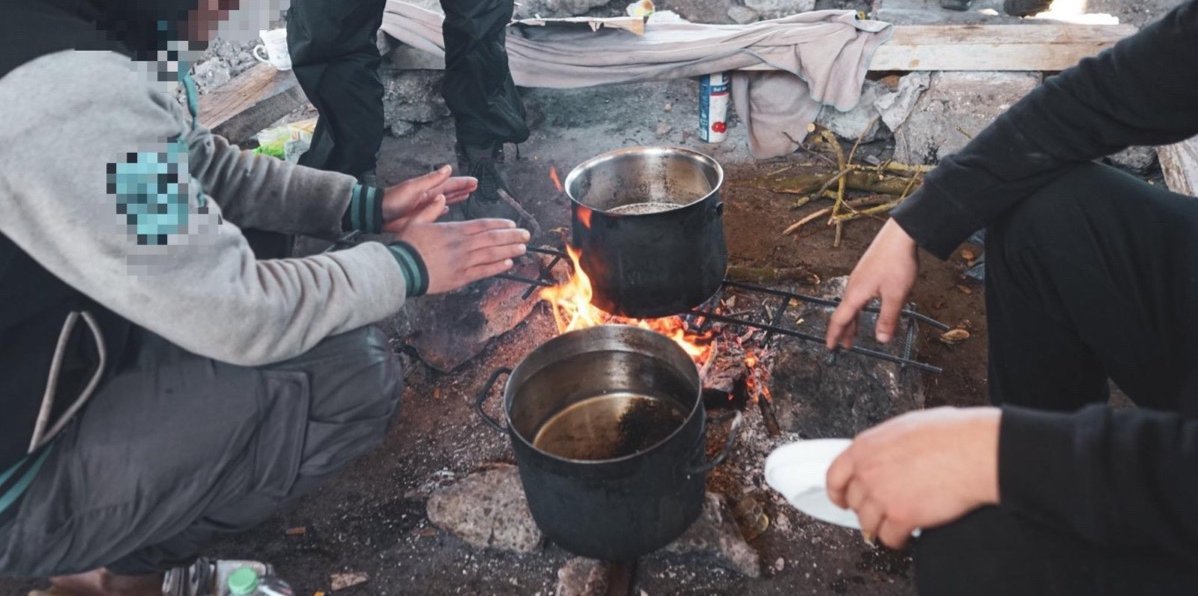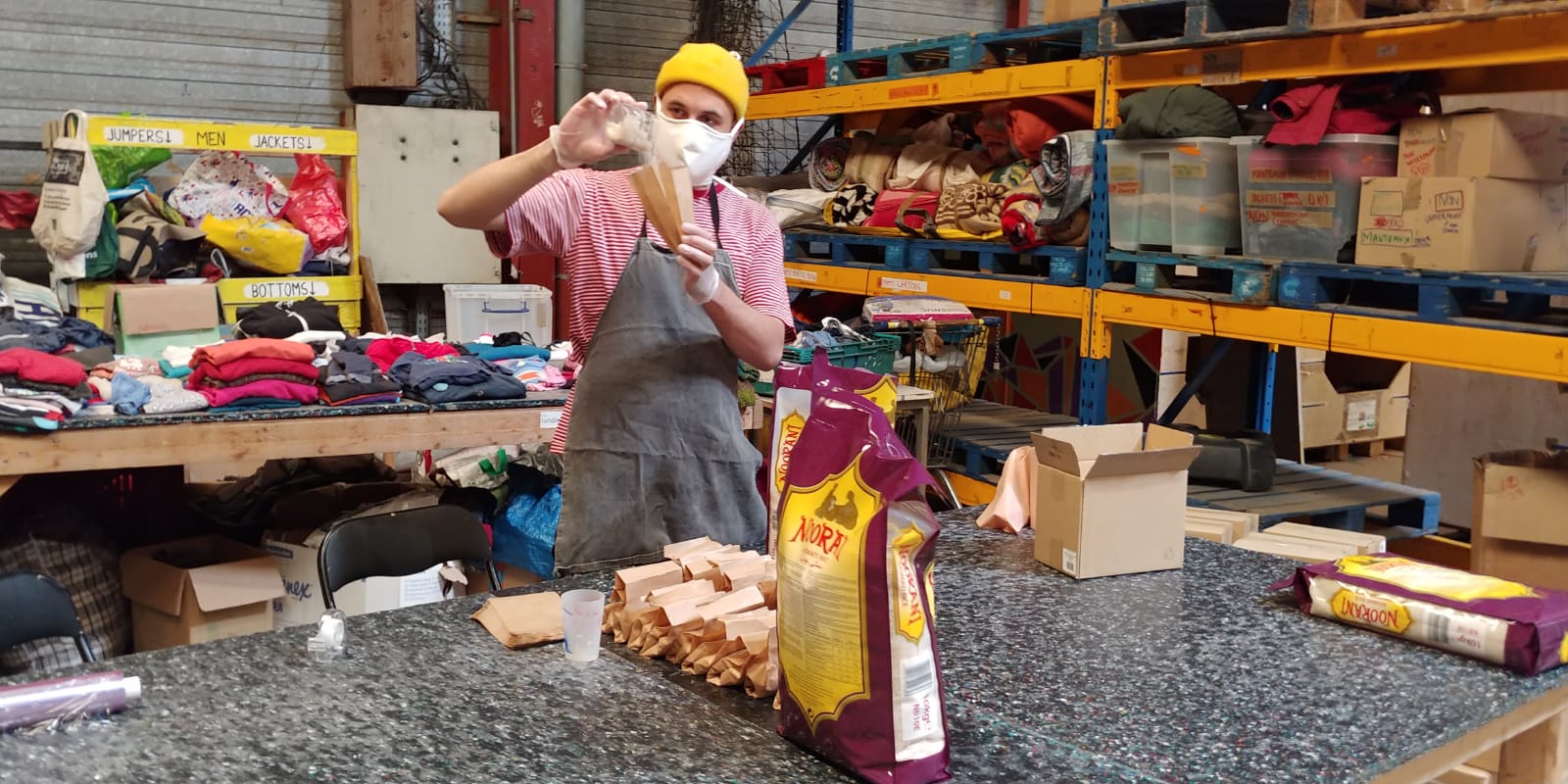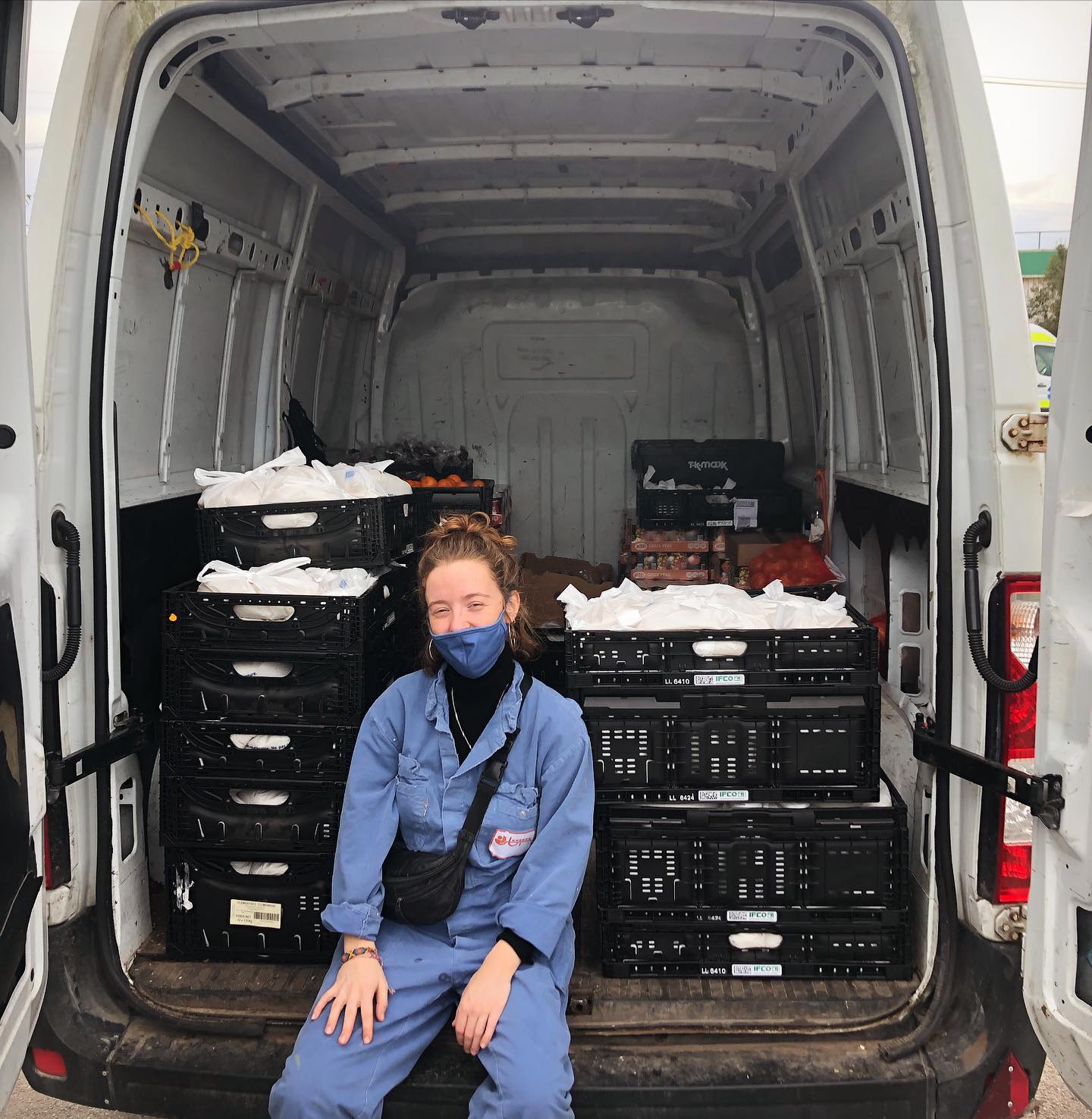 702
702  5 mins
5 mins Since the early 1990s, thousands of refugees and migrants have come to live in the towns of Calais or Dunkirk in Northern France. They gather, hoping to enter the United Kingdom or waiting for their claims for asylum to be processed. But because they are a voiceless community, the infrastructure dedicated to their needs has always been inadequate. Most of the displaced people living in these towns are houseless. The desperation of their situation rose to a new level in early 2020. “The human rights situation which has been unfolding in northern France over the past few decades… reached new depths of crisis due to the Covid-19 pandemic” reports Refugee Rights Europe.
In response to this crisis, the volunteers behind the Calais Food Collective decided to take matters into their own hands, delivering food provisions to displaced people during the food crisis.

Displaced people in northern France preparing a meal. Image courtesy of Calais Food Collective.
“Home” Lockdown
In March 2020, as the Covid-19 pandemic progressed globally, France announced its first home lockdown. Non-essential movement was restricted. The “home” lockdown immediately affected the large community of displaced people – refugees and migrants – living in houseless encampments in northern France.
Because of the lockdown, “State-funded services food provisions to displaced people in this region reduced their food provisions. They moved from hot food to basic sandwiches. Many NGOs who had been catering food had to make the difficult decision to pause or reduce their services.” according to Alex, spokesperson for the Calais Food Collective.
Cutting off reliable food provisions created a dangerous situation. The roughly 1,500 displaced people living in the streets of Calais and Dunkirk now lived in total food insecurity.
“On top of a lack of safe housing, sanitation provisions and water access points, there was now a food crisis (in the encampments).”
120 requests for emergency food provisions were recorded during the first five days of the lockdown according to Utopia 56, an NGO working with migrants and refugees living on the streets of Calais and Dunkirk.
Following the announcement of the nationwide lockdown, a small group of people decided to form a volunteer catastrophe response team. Their grassroots initiative is called the Calais Food Collective. They wanted to bring emergency aid to this neglected, vulnerable and voiceless community.
They began outreach, networking for money and support to start a dry food service. Their team quickly grew to 10.
Filling a gap
Their goal was to support the displaced people in Calais and Dunkirk. They did this by encouraging food autonomy and self-governance for the communities on the border. No dry food service had operated in the region since the eviction of the Calais Kitchens. The Calais Kitchens were demolished during the destruction of the “Calais Jungle” encampment in late 2016.
The Collective began distributing food packs. Dry, packaged food makes it possible for displaced people to cook their own food. Each pack contained rice, lentils, tomatoes, onions, garlic, salt, oil, tea bags and cooking and washing up equipment. Donating dry food also minimised the risk of spreading Covid-19.
Gradually, the different communities encamped at the border began cooking for themselves again.
“We aimed to distribute in a way that centralised the needs and requests of the community. We wanted to distribute food in a dignified, fair, and consistent manner. By working together with Calais Woodyard (another NGO supporting displaced people in Calais with daily distributions of firewood) we were able to build trust within the communities. We were able to visit living spaces, bringing food directly to the people we were serving.”

Calais Food Collective warehouse. Image courtesy of Calais Food Collective.
Beyond food provisions
Beginning in July 2020, the CFC expanded their services and began to provide water. Previously, there had been only one single water point accessible to displaced people in Calais. Furthermore, the location of that access point, combined with an intimidating police presence, deterred many people from using it.
Overnight, this small group of volunteers became the primary provider of water to hundreds of people. They distributed bottled water and also used a makeshift, bulk water tank retrofitted into a van.
When “cat and mouse” is a very serious game
After almost 6 months of successfully serving this community, the CFC faced an unforeseen challenge.
Orders were handed down by local government authorities criminalising “the distribution of food and drink across the city of Calais”. The local authorities have never disguised their displeasure with having so many displaced people in the city centre. By banning food distribution at specific locations, the authorities hoped to drive them to the outskirts of the city. The order effectively disrupted the CFC’s ability to distribute food at their regular delivery points.
In response, The Collective began to distribute food and water in the city at points not mentioned by government order. A “cat and mouse game” ensued. Since then, the authorities have amended the territorial scope of the order 8 times. The team at the CFC must now continuously check their maps to avoid arrest for distributing food and water.
Other challenges
Although they formed as a temporary response team for the first national lockdown, The Collective’s saga continues.
And like the communities they serve, the Collective faces significant daily challenges.
“It is a constant challenge to cater for the needs of people who have no safe housing or social care. They are constantly being moved and stolen from. They are victims of violence.” And these vulnerable communities are still today particularly vulnerable to Covid-19 transmission.
So simply delivering dry food, cooking fuel and water to people who are forced to live in the streets is physically and psychologically harrowing.
And this is even more true during the winter months which brings freezing temperatures and flooding to the camps.

Volunteer at the Calais Food Collective delivering supplies. Image courtesy of Calais Food Collective.
Success or failure?
Today, in addition to their operations in the Calais city centre, the CFC currently distributes food up to 4 times a week to 7 other sites in Calais and 2 sites in Dunkirk.
Their action – providing dry food and water to the uncounted people who pass through Calais and Dunkirk – is both a brilliant success and a glaring failure.
They have been successful at distributing food to the communities that live there. By doing this, they are reaching their goal of promoting food autonomy and self-governance.
However, they recognise that their work is excusatory. They are a stop-gap solution in the face of a woefully inadequate government response. The volunteers of the CFC are on-the-ground witnesses to the appalling living conditions of the victims of deeply flawed European migration policies.
“To draw our conclusions at this point (one year on), we place our resentment towards the state who is failing displaced people in northern France. The state is also responsible for harassment, abuse and deep mistreatment. We retain our promise to continue to provide for communities here. And we will utilise every effort to continue providing a service that is based upon request and fosters autonomy. We recognise our service as a supplement for state food services, and use this statement in protest against the state.“
For more information
Calais Food Collective – visit their website
The CFC is also running a fundraiser to support their action on JustGiving
Follow them on social media @ Instagram, Facebook or Twitter
Feature image credit: courtesy of Calais Food Collective (website)


 https://unsplash.com/photos/X6d8IKrUM0c
https://unsplash.com/photos/X6d8IKrUM0c https://bowseat.org/gallery/untitled-art-juwan-mayes/
https://bowseat.org/gallery/untitled-art-juwan-mayes/